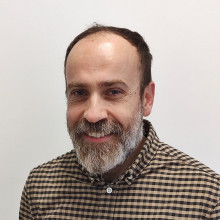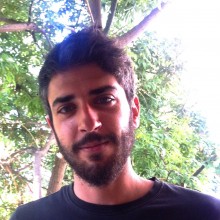English
Education
- 2020 PhD University of Crete, Physics Department Greece
- 2016 Master in “Photonics and Lasers” at the University of Patras (Greece), Department of Physics GPA: 8.66/10
- 2014 Diploma in Physics at the University of Patras (Greece), Department of Physics, GPA: 6.84/10
Interests
- Laser Matter interactions
- Measurement of the nonlinear optical properties of organic solvents, carbon derivatives and thin films employing the Z-scan technique in nanosecond, picosecond and femtosecond domains and Optical Kerr Effect (OKE) technique.
- Development of linear and non-linear optical setups Experimental techniques: Z-scan, Optical Kerr Effect (OKE), White light supercontinuum generation.
Multiple ionization of Argon via multi-XUV photon absorption induced by 20-GW high-order harmonic laser pulses
A. Nayak, I. Orfanos, I. Makos, M. Dumergue, S. Kühn, E. Skantzakis, B. Bodi, K. Varju, C. Kalpouzos, H. I. B. Banks, A. Emmanouilidou, D. Charalambidis, and P. Tzallas
Phys.Rev.A, Volume:98, Page:023426, Year:2018, DOI:https://doi.org/10.1103/PhysRevA.98.023426
An Experimental Study of the Structural Effect on the Nanosecond Nonlinear Optical Response of O-Doped Polycyclic Aromatic Hydrocarbons
I.Papadakis, Z.Bouza, A. Stathis, I. Orfanos, S. Couris, T. Mileti, and D. Bonifazi,
J. Phys. Chem. A , Volume:122, Page:5142−5152, Year:2018, DOI:10.1021/acs.jpca.8b02737
A twisted bay-substituted quaterrylene phosphorescing in the NIR spectral region
T. Miletić, A. Fermi, I. Papadakis, I. Orfanos, N. Karampitsios, A. Avramopoulos, F. De Leo, N. Demitri, G. Bergamini, P. Ceroni, M. G. Papadopoulos, S. Couris and D. Bonifazi
Chemistry A European Journal, Volume:100, Issue:11, Year:2017, DOI:doi.org/10.1002/hlca.201700192
Nonlinear optical response of some Graphene oxide and Graphene fluoride derivatives
N. Liaros, I. Orfanos, I. Papadakis, and S. Couris
Optofluid Microfluid Nanofluid , Volume:3, Issue:1, Page:6, Year:2016, DOI:10.1515/optof-2016-0009
Tailoring colors by O-annulation of polycyclic aromatic hydrocarbons
T. Miletić, A. Fermi, I. Orfanos, A. Avramopoulos, F. De Leo, N. Demitri, G. Bergamini, P. Ceroni, M. G. Papadopoulos, S. Couris and D. Bonifazi
Chemistry A European Journal, Volume:23, Issue:10, Year:2016, DOI:10.1002/chem.201604866
Ultrafast third order nonlinearities of several organic solvents
K. Iliopoulos, D. Potamianos, E. Kakkava, P. Aloukos, I. Orfanos, and S. Couris
Opt. Express, Volume:23, Issue:19, Page:24171-24176, Year:2015, DOI:10.1364/OE.23.024171
Education
- Ph.D. in Atomic & Molecular Physics, University Of Crete, Herakleion – Greece
- M.Sc. in Advanved Theoretical physics, University Of Crete, Herakleion – Greece
- B.Sc. in Physics, University Of Crete, Herakleion – Greece
Career
- Postoctoral Researcher
Interests
- Atomic & Molecular Dynamics
- Quantum Optics in strong–field physics
- Photon counting
- Photon statistics
- Quantum Information
- Nonlinear Phenomena
- Attosecond Physics

Office Phone: (+30) 2810 39 1398
Lab Phone: (+30) 2810 39 1321
Fax: G091
Email: iliontos(AT)iesl.forth.gr
Full CV: Download
Education
- 2007 PhD degree in experimental Physics, Atomic & Molecular Physics Laboratory, University of Ioannina, Ioannina, Greece
- 2001 Postgraduate courses at Physics Department, University of Ioannina, (Greece):
- 1999 B. Sc. in Physics, Physics Department, University of Ioannina (Greece)
Career
- 09/2018 – present Postdoctoral research associate, Institute of Electronic Structure and Laser, Foundation for Research and Technology – Hellas, Heraklion, Greece
- 09/2016 – 08/2018 Assistant Professor, Attosecond Science Laboratory (ASL), King Saud University, Riyadh 11451, Saudi Arabia (www.attoworld.sa)
- 03/2013 – 10/2015 Postdoctoral Research Fellow, Center for Plasma Physics & Lasers (CPPL), sub-10fs CEP-stabilized Laser Laboratory, Rethymno (Crete), Greece Research subject: ‘Ultrafast non-linear optical processes on metallic surfaces’ (http://www.cppl.
- 04/2015 – 08/2015 Research Fellow, University of Ioannina and Aristotle University of Thessaloniki
- 03/2008 – 02/2013 Postdoctoral Research Fellow, VUV/XUV Spectroscopy and Frontier Coherent Sources Laboratory, LENS Institute, University of Florence, Italy
- 11/2007 - 02/2008 Visiting Researcher, LENS, Florence, Italy, via an accepted research proposal submitted in LASERLAB Europe with code
Interests
- Attosecond pulse generation and applications
- Implementation of an ultrastable Michelson interferometer for VUV/XUV spectroscopic studies
- High-resolution XUV spectroscopy using Ti:sa harmonics
- Laser-atom interaction with nanosecond laser pulses
- Ultrafast non-linear processes on metallic surfaces
- Laser-molecule interaction with strong femtosecond laser fields
- Laser-made electrodes for 3D-diamond detectors

Full CV: Download
Education
- 2017, BSc, Department of Materials Science and Technology, University of Crete (UoC), Greece
- 2020, MSc, Department of Materials Science and Technology, University of Crete (UoC), Greece
Interests
- Rheology and Μicrorheology at Ηigh Pressures
Stabilization of Supramolecular Polymer Phase at High Pressures
Nikolaos A. Burger , Antonios Mavromanolakis, Gerhard Meier, Patrick Brocorens, Roberto Lazzaroni, Laurent Bouteiller, Benoit Loppinet, Dimitris Vlassopoulos
ACS Macro Lett. , Volume:10, Page:321-326, Year:2021, DOI:https://doi.org/10.1021/acsmacrolett.0c00834
Intermixed Time-Dependent Self-Focusing and Defocusing Nonlinearities in Polymer Solutions
A. Bogris, N. A. Burger, K. G. Makris, B. Loppinet, G. Fytas
ACS Photonics, Volume:9, Issue:2, Page:722, Year:2022, DOI:https://doi.org/10.1021/acsphotonics.1c01917
Complete Dynamic Phase Diagram of a Supramolecular Polymer
N. A. Burger, G. Pembouong, L. Bouteiller, D. Vlassopoulos, B. Loppinet
Macromolecules, Volume:55, Issue:7, Page:2609, Year:2022, DOI:https://doi.org/10.1021/acs.macromol.1c02508

Office Phone: (+30) 2810 391217
Email: cpyromali(AT)iesl.forth.gr

Office Phone: (+30) 2810 391252
Email: leogury(AT)iesl.forth.gr

Office Phone: (+30) 2810 395047
Email: lchambon(AT)iesl.forth.gr

Office Phone: (+30) 2810 391981
Email: abogris(AT)iesl.forth.gr

Office Phone: (+30) 2810 391260
Email: cocarillo(AT)iesl.forth.gr

Office Phone: (+30) 2810 391981
Email: salexan(AT)iesl.forth.gr




